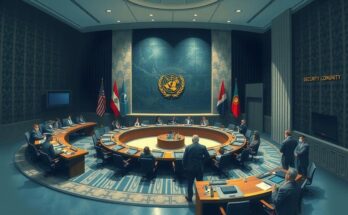Direct talks between the DRC and M23 rebels are scheduled for March 18 in Luanda, as mediated by Angola. This follows escalating conflicts, including M23’s recent territorial gains. The humanitarian crisis has resulted in thousands of deaths and widespread displacement, raising concerns about regional stability.
The Democratic Republic of the Congo (DRC) and the M23 rebels, who are backed by Rwanda, are set to commence direct peace negotiations next week. The announcement, made by Angola, indicates that talks will take place in the Angolan capital, Luanda, starting on March 18. This was confirmed by a spokesperson from DRC President Felix Tshisekedi’s office after receiving an official invitation from Angola to engage in discussions.
Angola has previously mediated efforts in the eastern DRC conflict, particularly after tensions escalated in late January when the M23 seized control of strategic locations, including the city of Goma. In February, they took Bukavu, the country’s second-largest city. The ongoing conflict has deep roots, connected to Rwanda’s historic genocide and the fight for DRC’s immense mineral wealth.
While Rwanda denies supporting the M23, the situation continues to be dire. President Tshisekedi traveled to Angola to explore the chances of negotiations, and his spokesperson revealed the invitation from Angola but did not confirm the government’s participation in the upcoming discussions. M23 leader Bertrand Bisimwa indicated that the rebel group’s pressure has led to this negotiating opportunity, labeling it as a necessary step towards resolving the long-standing crisis.
The ongoing conflict has resulted in significant loss of life, with government estimates indicating at least 7,000 fatalities since January. The United Nations refugee agency also reported that approximately 80,000 individuals have fled DRC due to violence, with many crossing into neighboring Burundi. M23 is among approximately 100 armed groups contending for control over the region’s rich mineral resources, which include coltan, cobalt, copper, and lithium.
Concerns are growing regarding potential regional instability, as troops from neighboring countries, including South Africa, Burundi, and Uganda, have been deployed in eastern Congo, which raises fears of a conflict on the scale of the devastating Congo wars of the 1990s and 2000s.
The impending peace talks between the DRC and M23 rebels signify a potential step forward in addressing the ongoing conflict exacerbated by historical grievances and resource competition. With Angola mediating, the discussions aim to resolve decades of unrest that have resulted in significant human suffering and displacement. The international community continues to monitor the situation closely, concerned about the broader regional implications amidst fears of renewed warfare.
Original Source: www.aljazeera.com




